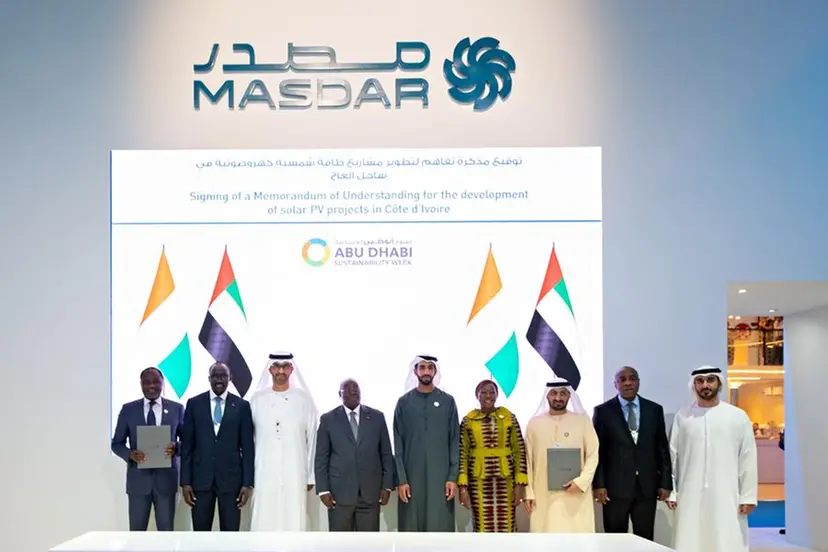Masdar, one of the world’s leading clean energy companies, has signed an agreement with the Ministry of Mining, Petroleum and Energy for the Republic of Côte d’Ivoire to explore the development of a solar power plant with a capacity of up to 70 megawatts (MW).
The agreement was signed in the presence of HE Tiémoko Meyliet Koné Vice President of the Republic of Côte d’Ivoire; HE Sheikh Shakhboot Nahyan Al Nahyan, UAE Cabinet Member and Minister of State in the Ministry of Foreign Affairs and International Cooperation, and HE Dr Sultan Al Jaber, UAE Minister of Industry and Advanced Technology, COP28 President-Designate and Chairman of Masdar. The signatories were HE Mamadou Sangafowa Coulibaly, the Ivorian Minister of Mining, Petroleum and Energy, and Fawaz Al Muharrami, Executive Director of Clean Energy, Masdar.
HE Mamadou Sangafowa Coulibaly, the Ivorian Minister of Mining, Petroleum and Energy, said, “Côte d’Ivoire has committed under climate change agreements to reduce its greenhouse gas emissions by 32 percent and to increase the share of renewable energies in its energy mix to 45 percent by 2030. In accordance with its commitments, Côte d’Ivoire has drawn up a master plan for the development of its production facilities, which integrates solar, hydroelectricity and biomass. The framework agreement that we have just signed with Masdar, accompanied by a first project of 50 to 70 MW, will contribute, in addition to the other initiatives that the Ivorian government is undertaking, to achieving this ambitious objective.
Mohamed Jameel Al Ramahi, Chief Executive Officer, Masdar, said, “As part of Masdar’s new shareholding structure launched in December, we have a goal of delivering 100 GW of clean energy around the world by 2030. With Africa’s massive projected development and growth and low current clean energy penetration levels, we see enormous potential for the renewable energy sector across the continent. This agreement will support Côte d’Ivoire’s clean energy goals and help to drive sustainable economic development for the nation.”
The agreements were signed under the umbrella of the Etihad 7 initiative, a UAE-led program that aims to raise public- and private-sector funds to invest in the development of Africa’s renewable energy sector, with the aim of achieving 20 gigawatts (GW) capacity to supply 100 million people across the continent with clean electricity by 2035.
As per the agreement, Masdar and the Ivorian Ministry of Mining, Petroleum and Energy will explore the joint development of solar photovoltaic plants in Côte d’Ivoire, starting with a first 50-70-megawatt (MW) plant. The plant would support the Republic of Côte d’Ivoire’s goal of 42 percent of its energy mix coming from renewable sources by 2030.
With the Côte d’Ivoire signing, there are now five Etihad 7 projects under agreement, with three others signed at ADSW 2023. These include: an agreement with Angola’s Ministry of Energy and Water for the development of renewable energy projects with a total capacity of 2 GW; an agreement with Uganda’s Ministry of Energy and Mineral Development for the development of greenfield renewable projects with a total installed capacity of 1 GW; and an agreement with Zambia’s Ministry of Energy, and Zambian national utility ZESCO Limited for the joint development of solar, wind, and hydroelectricity projects with a total capacity of 2 GW.
Last August, Masdar also signed an agreement with TANESCO, the sole provider of electricity in Tanzania, to develop renewable energy projects with a total capacity of up to 2 GW, also under the umbrella of the Etihad 7 program. The two parties are in the process of finalising the establishment of a joint venture company to advance this strategic collaboration.
According to the International Renewable Energy Agency (IRENA), less than half of the Sub-Saharan African population has access to electricity. Africa also generates just 20 percent of its electricity from renewable sources. The continent has a theoretical potential capacity of approximately 850 terawatts (TW) of solar and wind, according to a report produced last year produced by Masdar and Abu Dhabi Sustainability Week with analytical support provided by McKinsey & Company.
Masdar has already established a considerable presence in Africa, having formed its Infinity Power Holding joint venture with Egypt’s Infinity to target opportunities on the continent. In November, Masdar, Infinity Power and Hassan Allam Utilities signed an agreement with the Government of Egypt to develop a 10 GW onshore wind project – one of the largest wind farms in the world. The three companies are also cooperating on the development of green hydrogen projects in Egypt, targeting a combined electrolyzer capacity of 4 GW by 2030, and an output of up to 480,000 tonnes of green hydrogen per year. Masdar also has projects in Mauritania, Morocco, and Seychelles.




